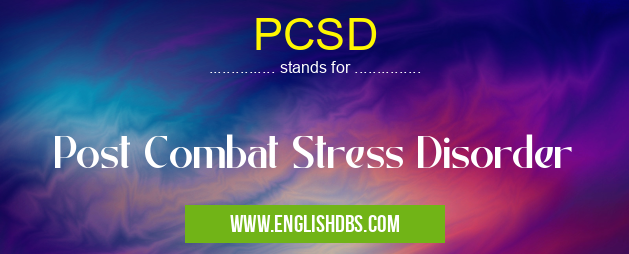What does PCSD mean in UNCLASSIFIED
Post Combat Stress Disorder (PCSD) is a mental health condition that can develop after experiencing or witnessing traumatic events, particularly in a combat setting. It is a serious and debilitating condition that can significantly impact the individual's life.

PCSD meaning in Unclassified in Miscellaneous
PCSD mostly used in an acronym Unclassified in Category Miscellaneous that means Post Combat Stress Disorder
Shorthand: PCSD,
Full Form: Post Combat Stress Disorder
For more information of "Post Combat Stress Disorder", see the section below.
PCSD Meaning
PCSD, or Post Combat Stress Disorder, refers to the psychological distress experienced by individuals who have been deployed in combat zones or exposed to the horrors of war. Symptoms of PCSD can include flashbacks, nightmares, avoidance of reminders of the traumatic event, emotional numbing, irritability, hypervigilance, and difficulty sleeping.
Symptoms of PCSD
- Flashbacks: Vivid and intrusive memories of the traumatic event
- Nightmares: Disturbing dreams related to the trauma
- Avoidance: Avoiding places, people, or activities that remind them of the event
- Emotional numbing: Feeling emotionally detached or unable to experience joy
- Irritability: Feeling easily angered or annoyed
- Hypervigilance: Constantly being on alert for danger
- Difficulty sleeping: Insomnia, nightmares, or restless sleep
Causes of PCSD
PCSD is caused by exposure to traumatic events that occur during combat. These may include:
- Witnessing or experiencing violence
- Being in danger of being killed or injured
- Seeing dead or injured people
- Feeling intense fear or helplessness
Risk Factors for PCSD
Certain factors can increase the risk of developing PCSD, such as:
- Experiencing severe or prolonged trauma
- Having a history of mental health problems
- Lacking social support
- Using alcohol or drugs to cope
Treatment for PCSD
Treatment for PCSD typically involves a combination of psychotherapy and medication. Psychotherapy can help individuals process the trauma, develop coping mechanisms, and improve their overall mental health. Medication can help manage symptoms such as anxiety, depression, and insomnia.
Essential Questions and Answers on Post Combat Stress Disorder in "MISCELLANEOUS»UNFILED"
What is Post Combat Stress Disorder (PCSD)?
Post Combat Stress Disorder (PCSD) is a type of Post-Traumatic Stress Disorder (PTSD) that specifically affects individuals who have experienced combat or other military-related trauma.
What are the symptoms of PCSD?
Symptoms of PCSD can include flashbacks, nightmares, avoidance of reminders of the trauma, emotional numbing, irritability, and difficulty sleeping.
Who is at risk for developing PCSD?
Individuals who have experienced combat or other military-related trauma, such as exposure to violence, injury, or death, are at risk for developing PCSD.
How is PCSD diagnosed?
PCSD is diagnosed by a mental health professional, such as a psychiatrist or psychologist, who evaluates the individual's symptoms and history.
What are the treatments for PCSD?
Treatments for PCSD include psychotherapy, medication, and lifestyle changes. Psychotherapy can help individuals process their trauma and develop coping mechanisms, while medication can help manage symptoms such as anxiety and depression.
Can PCSD be prevented?
While there is no guaranteed way to prevent PCSD, there are steps that can be taken to mitigate risk, such as providing support and resources to individuals who have experienced trauma.
What are the long-term effects of PCSD?
Untreated PCSD can lead to chronic mental health problems, relationship difficulties, and impaired job performance.
How can I get help for PCSD?
If you think you may have PCSD, it is important to seek professional help from a mental health professional. There are many resources available to support individuals with PCSD, including the Department of Veterans Affairs and the National Center for PTSD.
Final Words: PCSD is a serious mental health condition that can have a profound impact on an individual's life. It is important to seek help if you are experiencing symptoms of PCSD. With proper treatment, it is possible to manage the symptoms and improve your quality of life.
PCSD also stands for: |
|
| All stands for PCSD |
